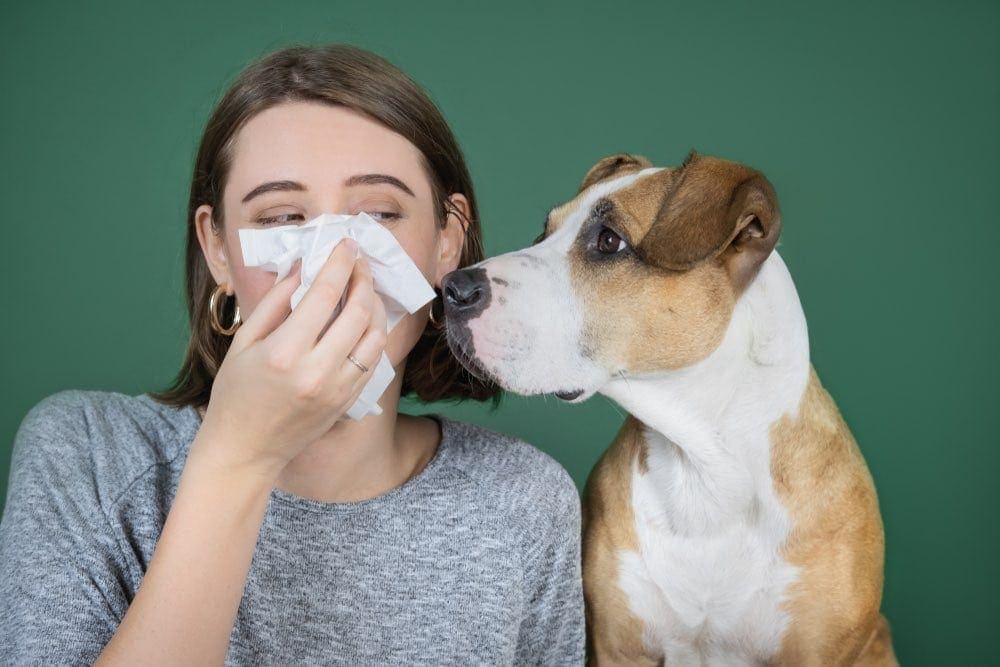How do you build up tolerance to pet allergies

Can You Build Up an Immunity to Dog Allergies? Vet-Approved Facts

The information is current and up-to-date in accordance with the latest veterinarian research.
Learn moreRoughly one-third of people around the world suffer from allergies, and 1530% of that number are allergic to pets. Not being able to have a dog because your body reacts with a runny nose and itchy eyes can be heartbreaking. The desire to keep hold of our four-legged family members has led to a great deal of research about ways to treat allergies.
The good news is there are a couple of ways to build up immunity to dog allergies. Youll be glad to hear that you can mitigate the problem by carefully managing your symptoms and exposure to dog-related allergies, in addition to trying immunotherapy, which well discuss below.
What Are Allergies?
Allergies are caused by your immune system overreacting to outside substances called allergens. These can be anything from pollen, mold spores, drugs, and food items to animal-related substances like urine and saliva.
Where our pets are concerned, the allergens that they carry in their saliva or the oil in their skin get spread to their fur. This is what makes people assume that its dog fur that theyre allergic to. Instead, its their dried saliva, which clings to loose hair, and dander that you come into contact with both on your dog and wherever theyve shed their fur around your house.
Pet allergies can be mild or severe depending on whether the allergic reaction triggers a more serious response, like bronchitis or asthma.
Symptoms of allergies include:
- Cough
- Dry skin
- Hives
- Itchy nose and eyes
- Rashes
- Runny nose
- Shortness of breath
- Sneezing
- Tickle in the throat
- Tight chest
- Watery eyes
- Wheezing
Severe allergic reactions can also cause anaphylaxis, which in extreme cases, can be fatal.
Who Suffers From Allergies?
Allergies can develop in anyone at any age, even in people who have been around the particular allergen their entire lives. Some people are more likely to develop allergies than others. For example, if your parents have allergies, youre more likely to develop your own, even if youre not allergic to the same things that they are.
Can You Build Immunity to Dog Allergies?
Unfortunately for allergy-suffering pet owners, theres no real cure for allergies. The only thing that we can do is take measures to limit our exposure to allergens or treat the symptoms. There is a way to build up a tolerance, or immunity, to certain allergies, though.
Immunotherapy is a method of desensitizing the body to allergens through injections. The idea is to use increasing amounts of the allergen to teach your immune system to stop overreacting whenever it comes into contact with it.
While this isnt a quick fix by any means, the point is to lessen the symptoms of allergic reactions. Its not something that you should try at home, though. Immunotherapy should only be attempted under the supervision of a medical professional.
What Other Ways Can Allergies Be Managed?
Immunotherapy might help in the long run, but in the meantime, youll still have to handle your allergy symptoms. Luckily for pet owners, there are a few ways of managing dog allergies without resorting to sending your favorite pooch away.
Clean
Dog fur might not set off your immune system, but the saliva and oil particles on it can. It gets stuck everywhere too: in the air, on your couch, and even your carpet. Keeping your house clean is a sure-fire way of limiting how many doggy-related allergens that you breathe in.
This may mean daily vacuuming sessions and regularly washing blankets and couch covers that your dog sits on. Mopping wooden floors instead of sweeping or dusting will also trap more allergens and prevent them from swirling back into the air again.
All these chores can get a little tedious, but when faced with the prospect of losing your pooch, any amount of work is a welcome alternative.
Dog-Free Zone
As heartbreaking as it sounds, keeping your dog out of your bedroom is the easiest way to give yourself a reprieve from allergens. This also means not allowing your dog to sleep on the bed with you.
By making a dog-free zone in your house, youll be able to retreat whenever your symptoms get particularly bad.
HEPA Filters
Designed to remove airborne pollutants and allergens like pollen and pet dander, HEPA filters are ideal for reducing the number of allergens in your home. You can buy them for your heating and A/C units or get air purifiers that you can place in different rooms.
Medication
Antihistamines, eye drops, inhalers, and nasal sprays are all common ways that people treat their allergy symptoms. They should be used alongside other measures to control the allergens in your home, but they can help reduce the discomfort from your symptoms.
You should discuss options with a doctor or allergist to properly consider your allergy, its severity, and what treatment is the best for you.
Regular Grooming Sessions
If you live with someone who suffers from pet allergies, you can help by bathing or grooming your dog more often. This will help you wash away the dander so it doesnt end up airborne. Gentle shampoo is the best for regular bathing sessions, but remember not to bathe your dog too often, as they can suffer from dry skin.
Keeping a good brush handy and grooming them every day is just as good, provided that you brush them outdoors.
Replace Carpets
The flooring in your home can affect your allergies too. Carpets and rugs both cling to fallen hair and dander, and it can be tough to get all the allergens out. Doing a bit of home renovation and installing wooden floors instead can help you reduce the number of allergens trapped in your living room. It can also give your home a sleek, modern look.
Wash your Hands
When it comes to pet allergies, its not just airborne particles that can cause issues. Coming into contact with their saliva or the oil on their skin by giving your dog their favorite scratches can also set off allergic reactions. This doesnt mean you cant pet your dog you just have to remember to wash your hands afterward.
Unfortunately, this does mean its best to stay away from kisses.
Are There Hypoallergenic Dogs?
Despite common belief, since dog allergies are related to saliva and oil instead of fur, there arent hypoallergenic dogs. All breeds create these allergens. Some dogs may cause fewer allergic reactions, but theres no real way of knowing which dogs will or wont set off your allergies until you encounter them.
Final Thoughts
Allergies are never fun to deal with. Theyre even less fun when its our dogs that set them off. Fortunately for doggy fanatics, allergies dont mean were doomed to forever live a life without pets. Treating allergy symptoms with medication and controlling exposure to allergens can help alleviate some of the discomfort.
You can also try immunotherapy to slowly build up an immunity to doggy-caused allergies. Its a lengthy process, but any wait is more than acceptable when it comes to cuddles with your favorite pooch.
Featured Image Credit:Aleksey Boyko, Shutterstock
Can You Build Up an Immunity to Cat Allergies? Vet-Reviewed Tips & Facts
The information is current and up-to-date in accordance with the latest veterinarian research.
Learn moreCat allergies are frustrating, especially when the sufferer is a cat lover. Cat allergies can cause skin rashes, nasal congestion, and asthma discomfort.
A common wifes tale is that exposing yourself to cats can help you build immunity to cat allergens. But theres no scientific evidence that exposing yourself to a cat in your home will make your allergies disappear; quite the opposite. However, there are medical treatments and tips you can apply to reduce your cat allergies. Understanding how allergies work and what treatments are available can help hopeful cat parents best treat their allergies in a way that allows them to live with their furry companions.
While immunotherapy shots increase your immune systems tolerance to an allergen and allow you to tolerate being around cats, simply living with a cat is not an acceptable form of immunotherapy!

Common Symptoms of a Cat Allergy
Do you think you may have a cat allergy? Check out the following list of the most common signs of cat allergies and see if it checks out. If you have a lot of signs on this list when youve recently met a cat, you might want to contact your doctor and have an allergy panel done!
- Coughing and wheezing
- Hives or a rash on the chest and face
- Red, itchy eyes
- Redness of the skin where a cat has scratched, bitten, or licked you
- Runny, itchy, stuffy nose
- Sneezing

How Do Allergies Work?
Allergies are a result of an overactive immune system in humans. Our immune systems are intended to identify harmful pathogens like bacteria, viruses, and parasites and eliminate them before they can take residence in the body. When the body identifies a threat, the immune system kicks in and attacks and kills the threat.
Allergies happen when the immune system identifies a harmless substance as a threat and attacks it as if it were a virus. Allergies are common and range in severity from causing some mild discomfort to being deadly.
When your body detects an allergen, the immune system will produce histamines. Histamines help your body remove the allergen from the system by having you sneeze it out, itch it off, or any of the other symptoms you may experience when having an allergic reaction.
People can have all sorts of allergies to everything from fragrances to cats and even water! Cats produce many allergens that can cause an allergic reaction, but cats most common allergens are found in dander, saliva, and urine.
The most severe kind of allergic reaction is called anaphylaxis. Anaphylaxis is a potentially life-threatening condition that can put a patient in a condition known as anaphylactic shock. When in anaphylactic shock, the blood pressure will crash, airways narrow, and the person may go into cardiac arrest. Fortunately, most cat allergies are not this severe but can still make life miserable.
Allergic signs may immediately develop when an allergen is introduced to the system. In other cases, it may take hours for the allergic signs to surface.
Cat allergies are among the most common allergies in humans. Additionally, 20% -30 % of people with allergic asthma will experience a flare-up when introduced to cat dander.

How Are Allergies Treated?
There are many different methods of treating cat allergies that range from non-invasive to somewhat invasive. There is currently no cure for cat allergies; those who have cat allergies will have to deal with them for their whole lives. The following methods can reduce allergy symptoms both before and during an attack.

Antihistamines
Antihistamines reduce the impact that histamines have on the body and reduce the allergy symptoms for the sufferer.
Decongestants
If you have trouble with your nose getting stuffy after you breathe near a cat, you might want to look into a decongestant to clear that up for you.
Nasal Steroid Sprays
Nasal steroid sprays are a standard allergy treatment available over-the-counter in many places under Flonase, Rhinocort, and Nasacort Allergy 24HR. But we recommend that you dont self-medicate without discussing it with your doctor first.
These medications dampen down the effects of an allergic reactionbut dont treat the underlying allergy. The immune system will continue to overreact when the drug is out of the system.
Suppose youre looking to reduce your long-term allergy medication usage. In that case, youll want to either start avoiding situations where cats might be or look into Allergen-Specific Immunotherapy if avoidance isnt possible or is unacceptable to you.

What Is Allergen-Specific Immunotherapy?
Allergen-specific immunotherapy (AIT) is when purified concentrates of the allergen in question are introduced to the persons system through an injection or under-the-tongue tablet. They desensitize the immune system to the allergen and allow the person to tolerate gradually larger introductions of the allergen.
AIT has an efficacy of 85%90% when reducing a persons allergen sensitivity. However, this process can take 36 months before any allergen relief is notable and 1214 months before complete relief from symptoms is achieved.
AIT is also a considerable time commitment. For the 1214 months that therapy is necessary, you will have to get your allergen shot every week religiously, or you may not see relief from your symptoms. Additionally, AIT may have waning efficacy over time as some patients have to return to clinics for booster shots because their allergy symptoms return.
Can Cat Allergies Be Prevented?
There is no way to prevent someone from getting cat allergies, but being around cats as a child does reduce the likelihood of cat allergies. Allergies can develop at any time in life, so just because you werent allergic as a kid doesnt mean you cant be an adult.
New advances are being made all the time, and scientists are looking to try to reduce and eliminate Fel d 1 antigens from cats. Feeding your cat special foods, such as Purina Liveclear, can also help.
Are Hypoallergenic Cats Real?
Theres no such thing as a truly hypoallergenic cat. While some cat breeds produce less dander than others, no cat is without dander. They all shed dead skin cells because theyre all covered in skin!

Final Thoughts
Unfortunately, you cant beat your immune system over the head with an allergen until it becomes desensitized to it. Even pharmacological intervention has limited efficacy when dealing with allergies. But hope is not lost for our allergic cat lovers out there! New developments in treating cat allergies are being made every day, and with the advances in immunotherapy already, theyre looking very promising!
Featured Image Credit: Pormezz, Shutterstock









